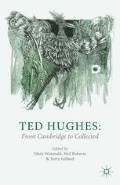Abstract
Once upon a time there was a poet, born in the north of his native country, a boy completely at home on the land and in the landscape, familiar with the fields and rivers of his district, living at eye level with the wild life and the domestic life.1 Educated first in local schools, he proved himself a gifted son and was chosen for further education in the great centres of learning in the south. There, as he mixed with the intellectual and social elite of that time and place, his extraordinary linguistic powers flourished and his first collections of poems gained him immediate notice and respect in the literary world. This early work reflected his deep reading in the canonical and contemporary poetry of his own and other languages, but it could not have been written without his memories of that first life in the unfashionable, non-literary world of his childhood. Then as he grew in achievement and reputation, his social circle widened and his sense of poetic destiny deepened. His eminence as a writer and his unaffected personality gained him powerful and influential friends and he would eventually become a favourite in the highest household of the land and be invited there on different occasions to read his poems aloud to the members of the ruling family. His reading voice was bewitching, and all who knew him remarked how his accent and bearing still retained strong traces of his north-country origins.
Access this chapter
Tax calculation will be finalised at checkout
Purchases are for personal use only
Preview
Unable to display preview. Download preview PDF.
Notes
W.B. Yeats (1997), ‘Ego Dominus Tuus’, in W.B. Yeats: A Critical Edition of the Major Works, ed. Edward Larrissy (Oxford University Press), p. 73.
Elaine Feinstein (2001), Ted Hughes: The Life of a Poet (London: Weidenfeld & Nicolson), p. 118.
Ted Hughes (1970), ‘Notes on the Chronological Order of Sylvia Plath’s Poems’, in Charles Newman (ed.), The Art of Sylvia Plath: A Symposium (Bloomington: Indiana University Press), pp. 187–95; p. 194.
John Webster (2009), The Duchess of Malfi [1623], ed. Leah S. Marcus (London: Arden Shakespeare), IV:2.
William Wordsworth (1991), ‘Michael’, in Wordsworth and Samuel Taylor Coleridge, Lyrical Ballads, 2nd edn [1800], ed. R.L. Brett and A.R. Jones (London: Routledge), p. 240.
T.S. Eliot (1951), ‘Tradition and the Individual Talent’, in Selected Essays (London: Faber & Faber).
T.S. Eliot (1969), The Complete Poems and Plays of T.S. Eliot (London: Faber & Faber), p. 38.
Editor information
Editors and Affiliations
Copyright information
© 2013 Seamus Heaney
About this chapter
Cite this chapter
Heaney, S. (2013). Suffering and Decision. In: Wormald, M., Roberts, N., Gifford, T. (eds) Ted Hughes: From Cambridge to Collected. Palgrave Macmillan, London. https://doi.org/10.1057/9781137276582_16
Download citation
DOI: https://doi.org/10.1057/9781137276582_16
Publisher Name: Palgrave Macmillan, London
Print ISBN: 978-1-137-27660-5
Online ISBN: 978-1-137-27658-2
eBook Packages: Palgrave Literature CollectionLiterature, Cultural and Media Studies (R0)

